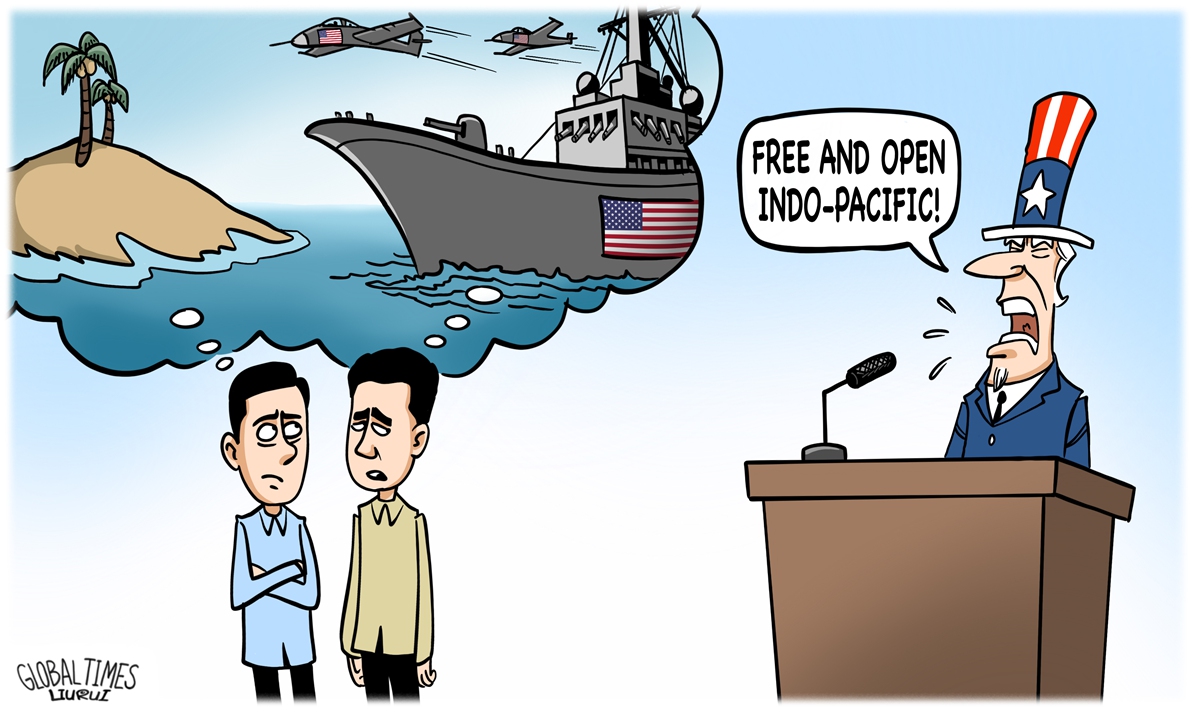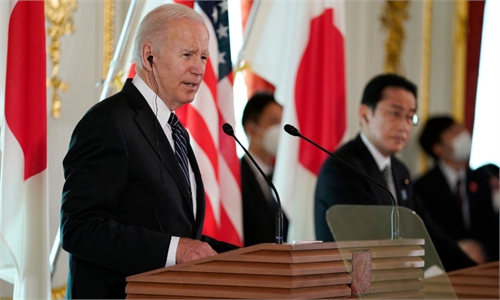US tries to maintain hegemony by using Asian country to suppress other Asian countries

Illustration: Liu Rui/GT
During US President Joe Biden's recent visit to Japan, he made no secret of the hostility toward China and continued to implement the so-called Indo-Pacific Strategy. In fact, the Indo-Pacific Strategy today is nothing but a copy of the Western maritime powers' control of the oceans, containment of countries on the edge of the Eurasian continent, and the implementation of colonialist policies seen throughout Asia over history. It is a historic continuation of the big powers' expansion to Asia.
The US' expansionary ambitions began in the mid-19th century. Following the Opium War in 1840, American opium dealers requested benefits from China. Then there was the "Treaty of peace, amity, and commerce, between the United States of America and the Chinese Empire," with the US receiving the same rights as the UK. The Hawaiian Kingdom was a sovereign state located in the middle of the Pacific Ocean and a relay station for the US across the Pacific Ocean to Asia. In 1893, the US Marines staged a coup to seize control of Hawaii. In 1898, the US annexed Hawaii.
In 1944, the US returned to the Philippines. After WWII, the US controlled almost all the major maritime traffic routes in the Pacific and Indian Oceans. The US' strategic thinking has always been based on geopolitics. British geographer Halford Mackinder once said, "Who rules Eastern Europe commands the Heartland; who rules the Heartland commands the World Island; who rules the World Island commands the world."
In February, the White House released a report titled "Indo-Pacific Strategy of the United States," in which it claims the Indo-Pacific region is "from Northeast Asia and Southeast Asia, to South Asia and Oceania, including the Pacific Islands." The US believes the region is increasingly facing challenges from China, and that China's revival is the transformation from land power to maritime power, challenging the US' domination over the Eurasian continent.
Japan once proposed "leaving Asia and joining Europe." It disdains for associating with its Asian neighbors, but instead, it pursued colonialism and militarism, annexed Ryukyu and Korean Peninsula, and occupied Taiwan, a Chinese territory. It also formed a military alliance with Nazi Germany, invaded China and Southeast Asia and competed with the US for hegemony in the Pacific region. After WWII, Japan became a vassal of the US, turning its policy of "leaving Asia and joining Europe" into "leaving Asia and joining the US." Facing China's rejuvenation, Japan took the lead in proposing the Indo-Pacific Strategy and the concept of a quadrilateral mechanism between Japan, US, Australia and India, which was later accepted by the US. To curb China's maritime development, it is only natural that Japan and the US, two countries that once fiercely competed for Pacific hegemony, should shake hands and make peace.
From the perspective of the US and Japan's geopolitical thinking, China's rejuvenation is an unprecedented challenge to the dominance of Western maritime countries over the past five centuries, a challenge to Anglo-Saxon control of the political situation in Eurasia in the past two centuries, as well as a challenge to Japan's superior position in East Asia in the past 100 years.
The "Indo-Pacific" mentioned by the US and Japan refers to countries in South Asia, Southeast Asia and Northeast Asia. These countries were invaded by Anglo-Saxon countries and Japan, and China also had the painful experience of being invaded. The Indo-Pacific Strategy proposed by the former aggressors is an attempt to divide Asia and destroy the peaceful environment for Asian countries' common rejuvenation. Their ultimate goal is to suppress China and prevent the revival of Asia. It lays bare the US' ill intention to maintain its hegemony and to use an Asian country to suppress other Asian countries. It is a repeat of history where Anglo-Saxon countries maintain maritime hegemony and expand to Asia.
Asia belongs to Asian people, and it is no longer a so-called paradise for Western powers to act rampantly with maritime hegemony. Any conspiracy or strategy to create division and sabotage Asia's development and unity is doomed to fail.
The author is director of the Department of Japanese Studies at Shanghai International Studies University. opinion@globaltimes.com.cn



